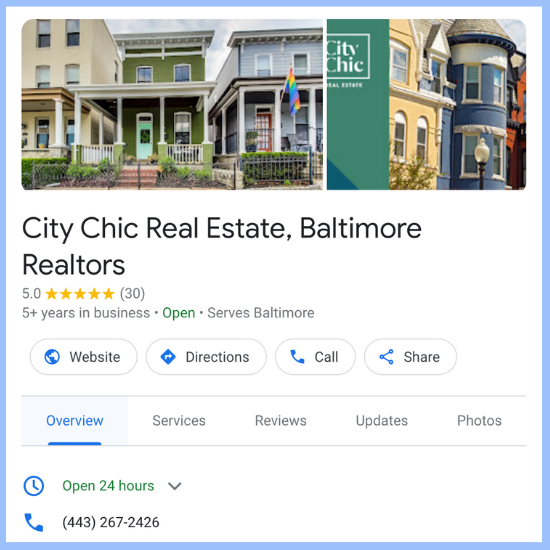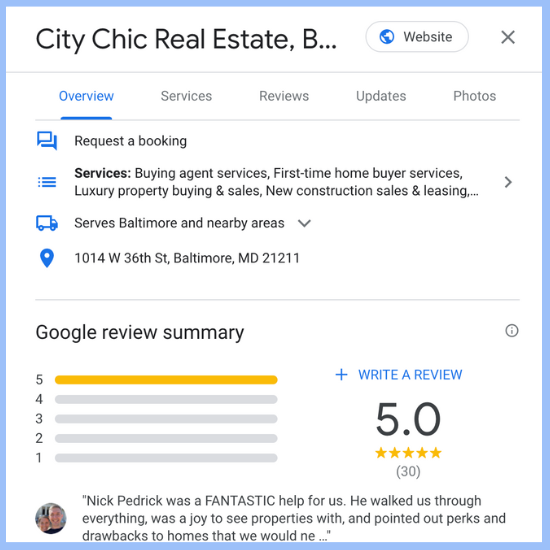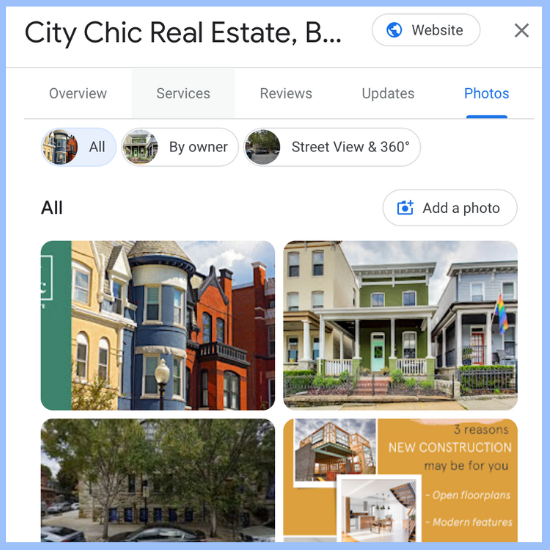If you’re a solo agent or a small team, you probably don’t have much time for figuring out the intricacies of SEO. But with more and more people turning to the web to search for homes and seek information, SEO is not something you should ignore, either.
This SEO guide was written just for you! I’ll share only the essentials of what you need to know—nothing more. Because you have more important things to do.

In the spirit of being succinct, let’s not waste any more time in getting started.
First, some things you need to know about SEO:
What is SEO?
SEO is search engine optimization—the process of improving your business’s visibility in search engines (e.g. Google, Bing, and Yahoo).
You might hear people throw around terms like “local SEO” and “on-page SEO.” Local SEO deals with building your presence on local listings sites like Yelp and Zillow, while on-page SEO is about optimizing content on your own website.
Does SEO really matter for real estate agents?
Yep. Here’s why:
A 2022 report from National Association of REALTORS shows that 47% of buyers being the home search by looking online for properties for sale, while 18% begin by contacting an agent. And even though the majority of buyers found their agent through a referral (38%), there were still 10% of buyers who found their agent by inquiring through a property they found online.
Real estate consumers are turning to the web first, so it’s important to make sure you have a visible online presence.
Beware of shady SEO companies
There are SEO companies out there who will claim they can get your website on page one of Google. Some might be honest…but a lot of them are practicing unethical SEO. They’ll stuff your webpages full of awkward keywords, create weird menu items, and write nonsensical blog posts on fake websites that link back to your site. None of these tactics will work, because Google has become smart enough to sniff out spammers.
Authenticity is the key to SEO success. Don’t waste your precious marketing dollars on a shady SEO company. You can do this yourself. (Or, make sure you go with a reputable SEO company, such as SmartSites or WebFX.
Your SEO To Do List:
Alright, let’s get down to business. Here is your stripped-down list of SEO tactics.
1) Manage your Google Business Profile
Google is the most popular search engine, so this is where you should focus your SEO efforts. One of Google’s most valuable features is the Business Profile, a free listing for your company that will appear in search results and Google Maps. This listing includes all the basics—your business name, phone number, address, hours of operation—as well as your star rating, Google reviews, a list of your services, posts (similar to how you would post on Facebook), and even a way for people to direct message you.
Your To Dos:
- Visit www.google.com/business, click Manage Now, and it will walk you through the steps.
- Once you’ve created your listing, ask your past clients to leave you a review.
2) Create profiles on other local listings sites, too
- Yelp – Find and claim your business page (or, if it doesn’t already exist, create it).
- Realtor.com – Check out the resources available to help you build your brand on Realtor.com.
- Trulia
- Zillow
3) Make sure your website is structured for SEO
To be able to optimize your website content, there are some structural elements that must be in place. (If you’re not sure about some of these, ask your web developer.)
- For your IDX, use RETS or FTP (iframe = bad for SEO)
- You should have the ability to update the following elements (these are where you’ll want to place keywords):
- Page title tag – This is not the actual headline on a webpage, but what appears in the browser tab and in search results.
- Meta description – This also appears in search results, as the description below the title.
- H1 header tag – The main headline on a page.
- Image alt tag – Text that provides search engines with a description of the image.
- URLs – If you can’t edit them, they should at least be simple and human-readable.
- Your blog should be on the same domain as your main website. The URL should look like blog.yourwebsite.com or yourwebsite.com/blog.
- Your website should be responsive (this means it adjusts to fit mobile devices). Check it using Google’s Mobile-Friendly Test.
- Make sure your website is indexed by Google (in other words, make sure Google is acknowledging its existence and that your site will show up in search results). Follow Step 1 of this article by Moz.
4) Use the right keywords on your website
Once you’ve made sure your website is structured properly, you can start optimizing with keywords.
“Keywords” are the words and phrases that people type into search engines. Your job is to figure out what people are typing into Google when they’re searching for homes/agents/information related to your market…and then to use those keywords on your website. If you’re a real estate agent in Seattle, for example, you might want to include keywords like “Seattle real estate” and “homes for sale in Seattle” on your website.
Your To Dos:
- Create a list of keywords that best describe your services. These should be phrased the way your prospects would phrase them. (Did you know you can use ChatGPT to help you generate lists of keywords?)
- Choose one keyword to focus on for each of your web pages. Use that keyword in the SEO hot spots: page title tag, H1 header tag, and URL.
- Don’t cram in keywords where they feel unnatural. Write for people first, search engines second.
5) Create useful, valuable content
Allow me to reiterate that last point…write for people first, search engines second. This is one of the most important things to understand about SEO.
The goal here isn’t to outsmart Google. You see, Google’s main objective is to provide searchers with the best possible answers to their queries. So your best bet is to write valuable content that Google will want to deliver to searchers. Focus on writing for your audience first. The other stuff—keywords, title tags, etc.—is just how you can help Google connect searchers with your content.
So, what kind of content should you be creating?
When homebuyers and sellers are in the very early stages of the process, many of them are doing online research, searching things like best time to put my house on the market or what are closing costs. You can capitalize on this behavior by providing the answers in a blog post or on a web page.
Your To Dos:
- Make a list of questions you’ve had more than one client or lead ask. (You can also check out our list of blog topic ideas for real estate agents.)
- Write a blog post answering each question. Use ChatGPT to help you create this content faster.
- Publish on a regular schedule (ideally, at least once a week).
- Promote your content on your social media accounts and via email. More on
6) Create links
Links play an important role in the way Google will rank your website. There are three different types of links:
- Internal: Links on your site that connect to other pages on your site.
- Outbound: Links on your site that connect to outside, third-party websites.
- Inbound: Links from other websites pointing back to your site. Sometimes called “backlinks.”
Inbound links hold a lot of sway over how your page is ranked by Google, but it’s a matter of quality, not quantity. So an inbound link to your blog post from Inman News will have more ranking power than a link from your own Facebook page.
Your To Dos:
- Create internal links – On each of your webpages, look for instances where it would be helpful to link a word or phrase to another page on your site. By linking related content together on your website, you indicate to Google that you have expertise on a topic. (Plus, it makes your site easier to navigate. People first, remember?)
- Create outbound links – Create links from your content to other websites’ content. Make sure they are credible, high value sites.
- Create inbound links – This one is tougher, because you can’t necessarily control who is linking to your website. Guest blogging on another site is one great way to create inbound links back to your site. For more ideas, check out this list of link building tactics by Point Blank SEO.
7) Post to social media
Social media can indirectly impact your SEO.
According to Search Engine Journal, posting your content to social media increases the chances of people visiting and engaging with your content, re-sharing your post with their social media followers, and linking back to it as a resource for their own blog post or web page.
So there you have it. The bare-bones guide to SEO for real estate professionals.
Remember, a lot of SEO best practices are unclear because Google wants to keep it that way. They don’t want anyone cracking the code. They just want to provide searchers with the best possible answers to their queries. Your job is to create the content that Google will want to deliver to them.
Go deeper on SEO
If you want more than the basics of SEO, here are a few great resources. They’re from some of the top authorities on search engine optimization:
- The Beginner’s Guide To SEO [Moz]
- 25 Ways To Have SEO Success With Google In 2023 (Neil Patel]
- On-Page SEO 101: Tips for Keyword Optimizing the Most Critical Parts of Your Website [HubSpot]
This article was originally published on February 21, 2017. It has been updated to reflect the latest in SEO best practices.







